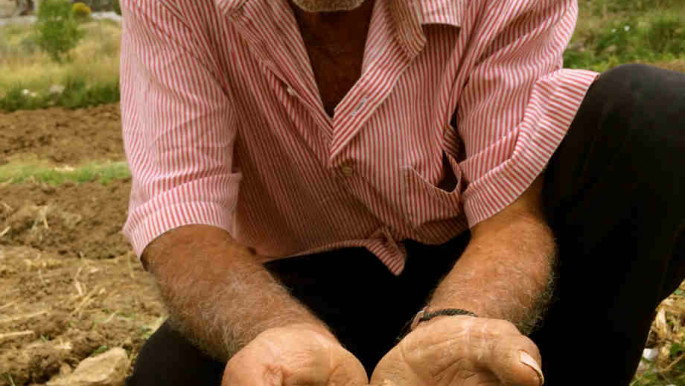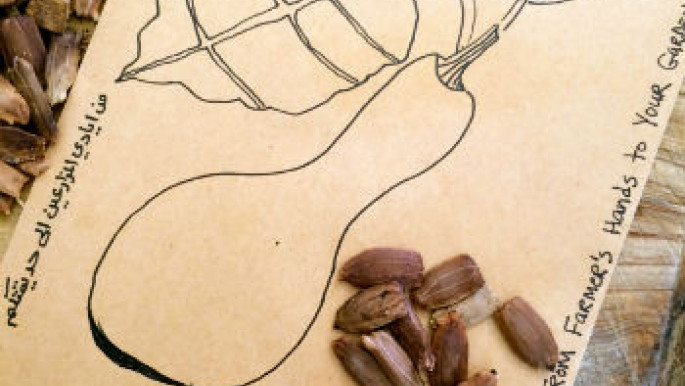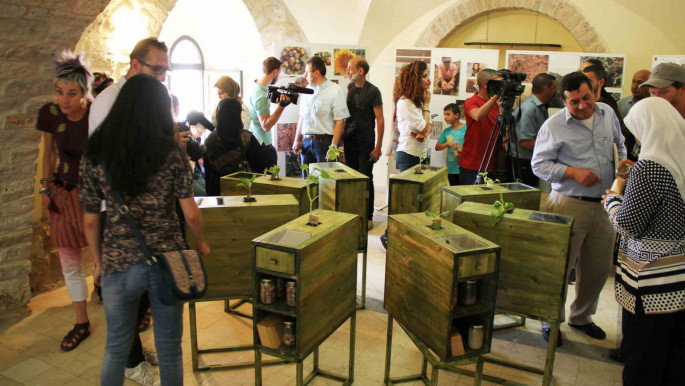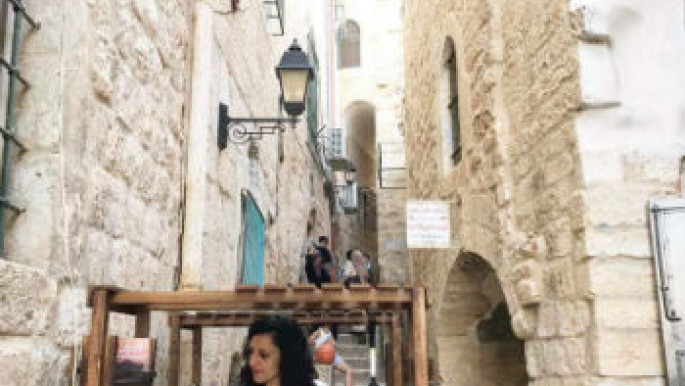Palestine's seed library finds fertile ground to pioneer sustainable farming
In-depth: An assertion of belonging in a context of colonisation, Palestine's seed library is getting to the roots of cultural identity and reviving heirloom strains of produce, reports Gawan MacGreigair.
6 min read
Reviving long-lost strains of produce is about more than agriculture [Ayed Arafah]
It was the hunt for the elusive purple carrot that started it all.
A much-missed taste of home during a spell abroad, the powerful sensory memory led Vivien Sansour, founder of the Palestine Heirloom Seed Library, on a quest to rediscover the local variety during one visit home to the West Bank.
Farmer after farmer was interrogated, false leads led to dead ends, and it seemed a distinct flavour of Palestine might have slipped quietly, devastatingly, into extinction - until a chance encounter at a market stall.
"I asked this farmer," Sansour recounts, "if he had purple carrots, and he said 'not really…'. But then he lifted part of a tablecloth, and there was a box of purple carrots. It felt like we were doing a drug deal! He said 'I can't give it to you, somebody has ordered it.' So I said: 'Give me at least a couple.' I went home, put them in the ground, and later we collected the seed."
Near-extinction was, Sansour found, a threat also facing a huge range of other local vegetables - unique varieties bred by Palestinian farmers over thousands of years for their ability to thrive in the their particular geologies and climate.
As her personal collection of seeds grew, her Facebook posts brought passionate responses. "What was just a few jars became a bigger conversation, and when people would call me wanting seeds I thought, 'why don't we have a national seed library?'"
From a handful of carrots has grown an ambitious project, named by Food Tank, the international sustainable agriculture think tank, as one of its "organisations to watch" in 2018 - and with good reason, for the Seed Library has just launched field trials, in partnership with 20 West Bank farmers, with the potential to make a globally important contribution to feeding the warming planet.
Key to this is a class of seeds known as Ba'al, named for the Canaanite fertility deity and famed for thriving entirely without irrigation. The value of crops requiring only residual soil moisture and surface dew is clear in an increasingly drought-struck world.
Read more: Permaculture and the sustainability of resistance
With support from the New Field Foundation, farmers commit to a year of growing Ba'al strains of wheat, tomato, watermelon and a white cucumber, followed by a conference to build on their experiences - the impetus, Sansour hopes, for Palestine's heirloom varieties to be grown more widely.
As well as possible insurance against climate change, these heritage seeds also resist the homogenising imperatives of industrial agri-business, which markets sterile hybrid seeds to farmers, offering uniform and predictable results but requiring outlay in the purchase of seeds and agri-chemicals.
Even farmers working within that agri-industrial model, however still hold appreciation for the heirlooms.
"They love and miss these varieties," says Sansour. "And the Ba'al seed costs you zero, you just have to prepare the land. The risk is: is it going to produce as much, are people going to buy it? People want the perfectly shaped vegetable. So these are things we are working on. I am very faithful that it will lead to something good."
The Seed Library is more than a utilitarian exercise in finding climate-ready genetic strains and cutting agricultural input costs, important as those are. In evidencing millennia of Palestinian presence on the land, it is an assertion of belonging in a context of colonisation and cultural erasure.
"We've been so trained to think we can't produce anything, that we're not good enough. I'm talking about us as Palestinians, but this is something I notice with most colonised populations. In the revival of Native American agro-ecological traditions a lot of people are finding pride in their ancestry, which before they were told was 'primitive'.
"The Seed Library is a catalyst in shifting the conversation from 'poor helpless us' to 'wow, if my grandmother is intelligent enough to pass down to me a seed that can live without irrigation, there must be something good in my DNA, just as there is something very brilliant in the DNA of this seed'."
Building the library has revealed just how integral heirloom varieties are to Palestinian culture, and how they open the floodgates to individual, familial and communal memory.
The Habeh Soda wheat strain, for example, turned out to be better known by its affectionate nickname, Abu Samara, meaning 'the handsome brown one'.
"The farmers," Sansour says, "get excited, as if talking about their long-lost love, and that is magical because you're not only reviving a biological heritage but a personal treasure.
"One guy said: 'As a kid, when my mother would make Abu Samara bread I would sit impatiently for it, and it was more delicious than cake.' Or people describe the potency of this amazing Ba'al tomato, like 'I could smell the tomato a mile away and its aroma reminds me of summer when I used to go with my father to this terrace and we would collect these tomatoes'."
Read more: The roots of resilience in Palestine's eco-culture
At the centre of the project is a library in the almost-familiar sense, with people able to "check out" heirloom seeds in hand-labelled brown envelopes from the project's home at the El Beir Arts & Seeds studio in Beit Sahour, just outside Bethlehem, on the understanding that a portion of harvested seeds will be gifted back.
Recognising the power of the seeds' stories, the library will also in 2018 send its "Travelling Kitchen" to a different West Bank community each month. The handcart-like wooden kitchen is a beautiful but functional work of art - constructed by artist and El Beir Arts & Seeds co-founder Ayed Arafah - and functions, Sansour says, "like a seed that you throw in there, and people gather around it and have discussions - elders, youth, farmers, everybody comes together".
It is an opportunity to talk about the value of heirloom varieties and the problems with hybrid seeds and chemical agriculture, but, she emphasises, "it's not just coming to lecture".
"We learn from our elders, we have intergenerational appreciation and learning, and for us at the library we learn about new varieties we hadn't heard about."
Sansour is clear that the cultural and social value of the library has at least as much importance as its functional and research importance: "With each seed there's a story, with each story comes a tradition, and with each tradition comes a way of life. We're not a seed bank, our objective isn't to just collect the genetic code and keep it in a freezer for a doomsday. The idea is actually to create life and to keep something so beautiful alive, and to keep a culture alive through these little seeds that seem like dead little things but in reality are life-giving."
A much-missed taste of home during a spell abroad, the powerful sensory memory led Vivien Sansour, founder of the Palestine Heirloom Seed Library, on a quest to rediscover the local variety during one visit home to the West Bank.
Farmer after farmer was interrogated, false leads led to dead ends, and it seemed a distinct flavour of Palestine might have slipped quietly, devastatingly, into extinction - until a chance encounter at a market stall.
"I asked this farmer," Sansour recounts, "if he had purple carrots, and he said 'not really…'. But then he lifted part of a tablecloth, and there was a box of purple carrots. It felt like we were doing a drug deal! He said 'I can't give it to you, somebody has ordered it.' So I said: 'Give me at least a couple.' I went home, put them in the ground, and later we collected the seed."
Near-extinction was, Sansour found, a threat also facing a huge range of other local vegetables - unique varieties bred by Palestinian farmers over thousands of years for their ability to thrive in the their particular geologies and climate.
As her personal collection of seeds grew, her Facebook posts brought passionate responses. "What was just a few jars became a bigger conversation, and when people would call me wanting seeds I thought, 'why don't we have a national seed library?'"
 |
| Grassroots activism: Sustainable agriculture meets an ecological need, but also gets to the roots of community identity [Vivien Sansour] |
From a handful of carrots has grown an ambitious project, named by Food Tank, the international sustainable agriculture think tank, as one of its "organisations to watch" in 2018 - and with good reason, for the Seed Library has just launched field trials, in partnership with 20 West Bank farmers, with the potential to make a globally important contribution to feeding the warming planet.
 |
|
| Seeds are packaged in hand-labelled packets [Vivien Sansour] |
Key to this is a class of seeds known as Ba'al, named for the Canaanite fertility deity and famed for thriving entirely without irrigation. The value of crops requiring only residual soil moisture and surface dew is clear in an increasingly drought-struck world.
Read more: Permaculture and the sustainability of resistance
With support from the New Field Foundation, farmers commit to a year of growing Ba'al strains of wheat, tomato, watermelon and a white cucumber, followed by a conference to build on their experiences - the impetus, Sansour hopes, for Palestine's heirloom varieties to be grown more widely.
As well as possible insurance against climate change, these heritage seeds also resist the homogenising imperatives of industrial agri-business, which markets sterile hybrid seeds to farmers, offering uniform and predictable results but requiring outlay in the purchase of seeds and agri-chemicals.
Even farmers working within that agri-industrial model, however still hold appreciation for the heirlooms.
"They love and miss these varieties," says Sansour. "And the Ba'al seed costs you zero, you just have to prepare the land. The risk is: is it going to produce as much, are people going to buy it? People want the perfectly shaped vegetable. So these are things we are working on. I am very faithful that it will lead to something good."
The Seed Library is more than a utilitarian exercise in finding climate-ready genetic strains and cutting agricultural input costs, important as those are. In evidencing millennia of Palestinian presence on the land, it is an assertion of belonging in a context of colonisation and cultural erasure.
 |
| The seed library has grown in popularity [Vivien Sansour] |
"We've been so trained to think we can't produce anything, that we're not good enough. I'm talking about us as Palestinians, but this is something I notice with most colonised populations. In the revival of Native American agro-ecological traditions a lot of people are finding pride in their ancestry, which before they were told was 'primitive'.
"The Seed Library is a catalyst in shifting the conversation from 'poor helpless us' to 'wow, if my grandmother is intelligent enough to pass down to me a seed that can live without irrigation, there must be something good in my DNA, just as there is something very brilliant in the DNA of this seed'."
Building the library has revealed just how integral heirloom varieties are to Palestinian culture, and how they open the floodgates to individual, familial and communal memory.
 |
|
| The 'Travelling Kitchen' is set to leave Beit Sahour for a tour across the occupied Palestinian territories [Yasmeen Mijali] |
The Habeh Soda wheat strain, for example, turned out to be better known by its affectionate nickname, Abu Samara, meaning 'the handsome brown one'.
"The farmers," Sansour says, "get excited, as if talking about their long-lost love, and that is magical because you're not only reviving a biological heritage but a personal treasure.
"One guy said: 'As a kid, when my mother would make Abu Samara bread I would sit impatiently for it, and it was more delicious than cake.' Or people describe the potency of this amazing Ba'al tomato, like 'I could smell the tomato a mile away and its aroma reminds me of summer when I used to go with my father to this terrace and we would collect these tomatoes'."
Read more: The roots of resilience in Palestine's eco-culture
At the centre of the project is a library in the almost-familiar sense, with people able to "check out" heirloom seeds in hand-labelled brown envelopes from the project's home at the El Beir Arts & Seeds studio in Beit Sahour, just outside Bethlehem, on the understanding that a portion of harvested seeds will be gifted back.
Recognising the power of the seeds' stories, the library will also in 2018 send its "Travelling Kitchen" to a different West Bank community each month. The handcart-like wooden kitchen is a beautiful but functional work of art - constructed by artist and El Beir Arts & Seeds co-founder Ayed Arafah - and functions, Sansour says, "like a seed that you throw in there, and people gather around it and have discussions - elders, youth, farmers, everybody comes together".
It is an opportunity to talk about the value of heirloom varieties and the problems with hybrid seeds and chemical agriculture, but, she emphasises, "it's not just coming to lecture".
"We learn from our elders, we have intergenerational appreciation and learning, and for us at the library we learn about new varieties we hadn't heard about."
Sansour is clear that the cultural and social value of the library has at least as much importance as its functional and research importance: "With each seed there's a story, with each story comes a tradition, and with each tradition comes a way of life. We're not a seed bank, our objective isn't to just collect the genetic code and keep it in a freezer for a doomsday. The idea is actually to create life and to keep something so beautiful alive, and to keep a culture alive through these little seeds that seem like dead little things but in reality are life-giving."





 Follow the Middle East's top stories in English at The New Arab on Google News
Follow the Middle East's top stories in English at The New Arab on Google News


